Pathways of Climate Insecurity: Guidance for Policymakers
Policymakers are increasingly concerned with the climate-related security risks—the adverse effects of climate change on peace and security.
This SIPRI Policy Brief outlines four interrelated pathways between climate change and conflict: (a) livelihoods, (b) migration and mobility, (c) armed group tactics, and (d) elite exploitation. These illustrate the relationship between short- and long-term environmental changes linked to climate change; their impact on the root causes and dynamics of violent conflict; and the critical role of human action, reaction and inaction in mediating violent outcomes.
As a policymaking tool, pathways help to identify and navigate the political space for mitigating violent conflict. They can support decision makers in navigating these complex relationships in conflict-affected and climate-exposed regions by integrating local context into analyses of the security and conflict risks of climate change. Pathways also help to facilitate policy planning in areas such as livelihoods, mobility, resource management and governance.



